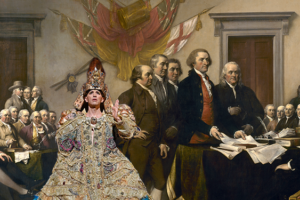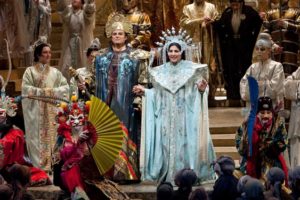

A production as delectable as the current one (through Sunday) at the Juilliard Opera will make you wonder why Il Turco is not as well known as L’Italiana, Il Barbiere, La Cenerentola, even the odd and occasional Il Viaggio a Rheims. The tunes are quite as attractive, the characters as memorable. The answer may be that the best-known of Rossini’s comedies are simple fairy tales: Tenor meets girl (or girl tracks down tenor) and together they outwit the bassos. It’s easy to pick sides!
Il Turco isn’t like that at all: It’s a modern sort of story, with a Pirandellian conceit in that a poet (Prosdocimo—is that a name?) seeks inspiration and continually comments on, and interferes with, the action. His motives are theatrical, which is to say, innately unethical. An Italian lady, Fiorilla, is bored with both her old husband (Don Geronio) and her young lover (Don Narciso). She craves adventure, and is thrilled when a genuine Turk (Selim) appears and falls for her charms.
But Selim is on the rebound from a certain Zaida, and she shows up, too, to Fiorilla’s annoyance. Selim is a great believer in divorce and, for that matter, polygamy, while Geronio believes in beating up his wife’s lover, except there are so many of them. The 11 o’clock number goes to Fiorilla, sincerely ashamed of herself, though not very. Everyone pairs or threes off and goes home. The poet has his play.
The Juilliard production at the Peter Jay Sharp Theater has been attractively staged by John Giampietro in an Italian spa around the time of Fellini’s 8½ (which, if I recall correctly, has Rossini on the soundtrack during a spa sequence). Zaida, instead of a Gypsy fortune teller, is a spa mystic who “reads auras” for the customers. Fiorilla is decked in skirts and hats of the Jackie O era.
The Juilliard cast are talented musicians and enthusiastic stage actors but rather immature vocally, though they have no trouble filling this jewel-box of a theater. Special kudos are due to whoever coaches Italian diction at Juilliard: The singers all have tongue-twisting Rossini patter to get through, and each of them could be clearly understood.
The singing was of a high standard, with some allowance for opening night jitters. The star was Hyesang Park as Fiorilla, a slim and pretty soprano with an even, beautifully produced sound even when reaching high above the staff and elegant swift-paced ornaments, besides an alluring, plaintive line for her great cavatina. She is also a natural actress and a convincing flirt, with a winsome pout and terrific legs. Kara Sainz, as her rival, Zaida, had a pleasing mezzo but a great deal less to do.
Michael Sumuel, who played the titular Turk imposingly, produced a dry sound in the first act but warmed up in the second for his combative duet with Geronio. He has the rapid-fire baritone for Rossini, but must develop more depth and authority to his sound. Daniel Miroslaw sang the cuckolded Geronio.
His acting instincts for this figure of fun are decent (the production placed him on a massage table while Fiorilla “mounted” him, singing all the while), but his light bass lacks center-stage personality. Geronio is a “character” role for a great basso buffo, and the best of the breed triumphed in it in Rossini’s day; he is not very effective if the singer lacks character, and Miroslaw may simply be too young for it.
Baritone Szymon Komasa sang the poet-playwright with graceful authority, and one wished he had something more lyrical to sing. Joseph Dennis sang Fiorilla’s cicisbeo, Narciso, in an attractive, liquid tenor that aroused great enthusiasm, but his voice, too, could do with some aging and solidifying.
Tenor Nathan Haller sang Albazar, the “sherbet” role, Zaida’s sassy gay BFF in this production, and his light but pretty voice was not quite secure. All these singers will probably gain security in the course of the run, but their performances are highly enjoyable to start with.
The conductor, Speranza Scappucci, led the Juilliard Orchestra in a lively, swift-paced and gently uproarious performance. She has wit and pace and comic timing. None of Rossini’s musical jokes fell flat and none of them overstayed their welcome.
Photo: Ken Howard























Comments